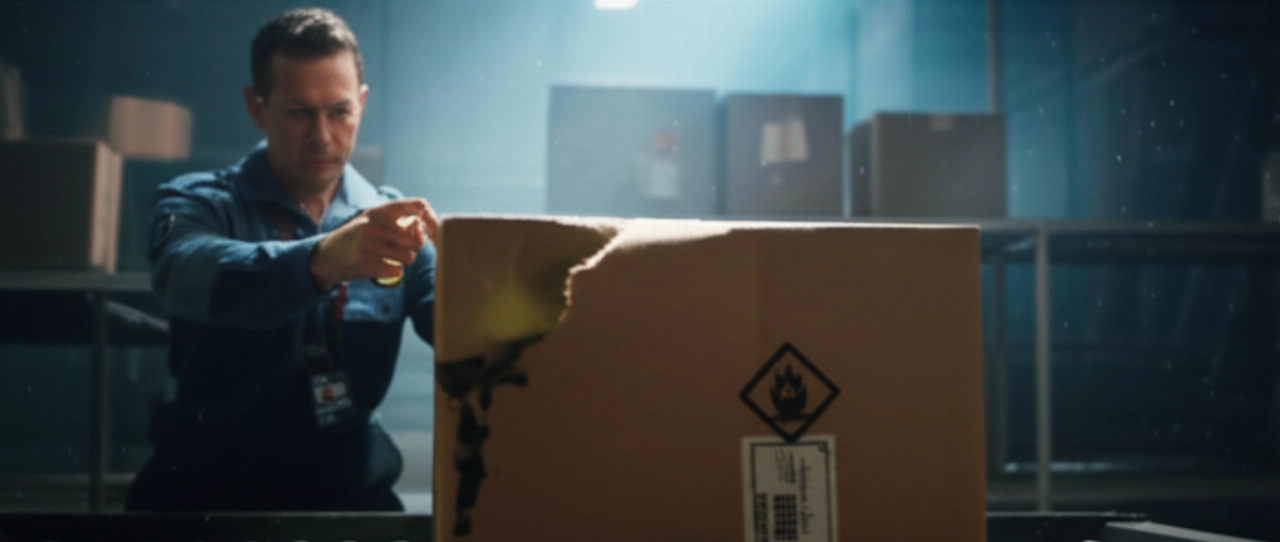Have you ever thought that shipping an item could turn into a bureaucratic nightmare or, worse, an unexpected penalty?
Many focus only on 'how' to ship, forgetting 'what'. Not knowing the rules about prohibited items can be costly, in terms of time, money, and even legal consequences.
In this comprehensive guide, we will reveal not only what cannot be shipped, but also why, providing you with the necessary knowledge to always ship in total safety and peace of mind. Your serenity is our priority. Let's begin.

Your Safety, Our Priority: Why Knowing the Prohibitions is Essential
When you entrust your goods to a courier, whether it's a personal item of sentimental value or a stock of products for your company, your main concern is that it arrives at its destination intact and without problems. But what happens if what you ship is, by law or by the carrier's internal regulations, considered prohibited or subject to restrictions?
Ignoring these regulations is not just a risk; it's a potential ticking time bomb. Consequences can range from simple delays to the destruction of goods, from seizure to hefty fines, up to much more serious legal implications. Knowing what cannot be shipped is the first step to protecting yourself, your goods, and your reputation.
At TrasportoMerci.net, we don't just transport: we provide you with the expertise and reliability needed to navigate this complex landscape, ensuring that every one of your shipments is not only efficient but also perfectly compliant with all regulations.

The Blacklist of Shipments: Categories of Prohibited Items and Restrictions
Goods that cannot be shipped or are subject to specific restrictions are classified for reasons of safety, legality, or their intrinsic nature. Here are the most common categories and the reasons for the prohibitions:
1. Dangerous Goods (ADR/IATA)
- Explosives: Fireworks, ammunition, detonators. Risk of explosion during transport.
- Gases: Gas cylinders, flammable aerosols, lighters. Risk of fire, explosion, or asphyxiation.
- Flammable Liquids: Gasoline, alcohol, paints, solvents, perfumes. Risk of fire.
- Flammable Solids: Matches, charcoal, some metal powders. Risk of spontaneous combustion or easy flammability.
- Oxidizing Substances and Organic Peroxides: Bleach, nitrate-based fertilizers. Can promote the combustion of other materials.
- Toxic and Infectious Substances: Poisons, pesticides, infected biological samples. Risk to human health and the environment.
- Radioactive Materials: Any material that emits radiation. Require special authorizations and specialized transport (IATA regulations).
- Corrosive Substances: Acids, unsealed lead-acid batteries. Can damage other materials or cause injuries.
- Miscellaneous Dangerous Goods: Lithium batteries (often with specific restrictions), dry ice. May present risks not covered by other classes.
2. Illegal Items or Against Public Morality
- Firearms and ammunition: Except with special authorizations and dedicated shipments.
- Drugs and narcotics: Absolutely prohibited by law.
- Pornographic or obscene material: Illegal or offensive content.
- Counterfeit goods: Violation of intellectual property rights.
- Live or dead animals: Require specialized transport and health permits.
- Plants and seeds: Often subject to phytosanitary restrictions, especially for international shipments.
3. Items of Extreme Value or Difficult to Insure
- Cash, bearer securities, checks, credit cards: High risk of theft and difficulty in traceability.
- Precious metals (ingots), precious stones: High value and risk.
- Priceless works of art: Require specific insurance and transport, often not handled by standard couriers.
- Antiques and collectibles: Fragility and high value.
4. Other Items with Specific Restrictions
- Perishable foods: Meat, fish, dairy products. Require cold chain and very fast delivery times.
- Pharmaceutical products: Often require licenses and controlled transport conditions.
- Tobacco and alcoholic beverages: Subject to taxes and excise duties, with customs and age restrictions.
- Lithium batteries: Often accepted only if installed in the device, with quantity and power limitations.
The complexity of this list underscores the importance of a partner who thoroughly understands the regulations and can guide you.
Don't Fall into the Trap: The Risks of Shipping Prohibited Items
The temptation to ship a prohibited item, perhaps to save money or due to ignorance, can lead to disastrous consequences. Here's what you risk:
- Seizure and Destruction of Goods: Customs authorities or the courier itself have the right to seize and destroy any prohibited item, without any refund.
- Fines and Monetary Penalties: Violations of regulations on the transport of dangerous or illegal goods entail very hefty administrative penalties, for both the sender and the recipient.
- Criminal Liability: In serious cases, such as the transport of drugs, weapons, or explosive materials, criminal charges with severe legal consequences may be incurred.
- Damage to People or Property: An improperly shipped dangerous item can cause fires, explosions, or spills, endangering the safety of courier personnel, other goods, and transport vehicles.
- Delays and Additional Costs: Even if seizure is avoided, the discovery of a non-compliant item can block the shipment, leading to delays and additional costs for managing the non-compliance.
Relying on a partner who protects you from these risks is not a cost, but an investment in your peace of mind and the continuity of your business.
Beyond the List: The Value of a Logistics Partner Who Guides You Through Complexity
At this point, you might feel overwhelmed by the number of rules and prohibitions. And this is where the true value of a logistics partner like TrasportoMerci.net comes into play.
We are not just a courier that moves packages. We are your expert consultants, ready to provide you with:
- Preventive Consultation: Even before shipping, we help you verify if your goods fall under prohibited items or require special precautions (e.g., specific packaging, ADR/CMR documentation, special permits).
- Tailored Solutions: If your item has restrictions but is not totally prohibited, we can devise the most suitable transport solution, perhaps with specialized couriers or dedicated services (e.g., transport of lithium batteries with specific procedures).
- Documentation Management: We guide you in completing the necessary documentation (DDT, CMR, declarations of conformity) to avoid customs or legal hurdles, especially for international shipments.
- Transparency and Reliability: With us, you will have no surprises. Every cost, every procedure, every potential risk will be communicated clearly from the first quote.
Our goal is to transform the complexity of freight transport into a simple, safe, and tailored solution, guaranteeing you maximum safety and peace of mind.
Frequently Asked Questions about What Cannot Be Shipped
Can I ship liquids or food?
It depends. Flammable liquids are prohibited. Other liquids (e.g., oils, cosmetics) can be shipped if well-packaged and non-hazardous. Perishable foods (meat, fish, dairy products) are generally prohibited by standard couriers because they require a cold chain and very fast deliveries. Non-perishable and packaged foods (e.g., pasta, preserves) are usually allowed, but always check customs regulations for international shipments.
What happens if I ship a prohibited item by mistake?
If a prohibited item is detected (often via scanners or random checks), the shipment will be blocked. The goods may be seized, destroyed, or returned to the sender at your expense. You could also incur hefty fines and, in serious cases, criminal liability. It is essential to always declare the contents and seek advice if in doubt.
Are lithium batteries always prohibited?
No, but they are subject to severe restrictions due to their fire risk. They are often accepted only if installed in the device they power (e.g., smartphones, laptops), with limitations on the number of batteries and their power (Wh). Loose or damaged batteries are almost always prohibited. For shipments with lithium batteries, it is essential to consult IATA and ADR regulations and rely on a specialized courier.
How can I know if my item is among the prohibited ones?
The safest way is to consult the official lists of couriers and national and international regulations (e.g., ADR for road transport, IATA for air transport). Even better, contact a logistics consultant like TrasportoMerci.net. Describe your item to us, and we will provide you with a clear and precise assessment, helping you avoid unpleasant surprises.
Does TrasportoMerci.net handle shipments with special restrictions?
Yes, our experience allows us to handle shipments that have restrictions or require special attention. We do not transport illegally prohibited items, but we can organize specialized transport for goods with restrictions (e.g., works of art, complex machinery, certain types of dangerous goods with the necessary authorizations and procedures), ensuring compliance with all regulations and maximum safety.
Your Peace of Mind is Priceless: Ask for Your Custom Quote Now
Now you have a clear vision of what cannot be shipped and, above all, why it is so important to know these rules for your safety and that of your goods.
Perhaps you think navigating these regulations is too complex. In reality, you don't have to do it alone. The true cost is not relying on an expert, but risking fines, seizures, or irreparable damage for a non-compliant shipment.
Leave nothing to chance when it comes to your shipment. Your peace of mind is priceless. The first step is a free consultation on your specific transport needs. Click here, describe what you need to ship, and receive a clear, detailed, and no-obligation quote, with the certainty of complying with all regulations. Discover the safest solution for you now.
You might also be interested in: